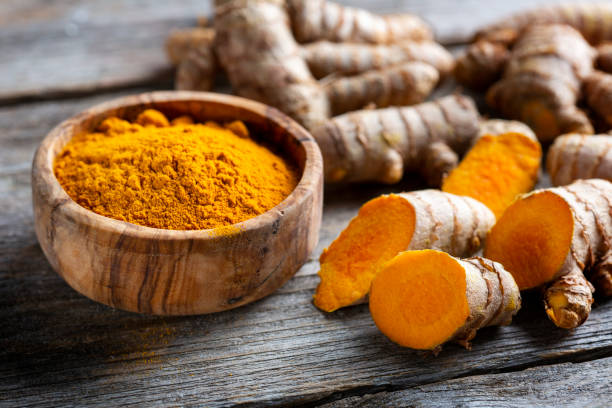Curcumin, the active compound found in turmeric (Curcuma longa), is a vibrant yellow chemical with a reputation that extends far beyond its culinary uses. While turmeric has been a staple in South Asian cuisine and traditional medicine for centuries, modern science is increasingly shining a spotlight on curcumin’s impressive health benefits. From its anti-inflammatory and antioxidant properties to its potential role in preventing chronic diseases, curcumin has earned its place as a subject of significant scientific interest.
What is Curcumin?
Curcumin is a polyphenol that belongs to a class of compounds called curcuminoids, which are primarily responsible for turmeric’s characteristic yellow color. Turmeric, the root of the Curcuma longa plant, is widely used as a spice in cooking, especially in Indian and Southeast Asian cuisines. Curcumin constitutes approximately 3-5% of turmeric by weight, though this can vary depending on the source.
Health Benefits of Curcumin
- Anti-Inflammatory Properties
One of the most well-documented benefits of curcumin is its potent anti-inflammatory effect. Chronic inflammation is linked to numerous health issues, including heart disease, diabetes, and cancer. Curcumin has been shown to inhibit several molecules that play a significant role in inflammation, such as nuclear factor kappa B (NF-kB) and cyclooxygenase-2 (COX-2). By blocking these inflammatory pathways, curcumin helps to reduce inflammation and may aid in the management of inflammatory conditions like arthritis.
- Antioxidant Activity
Curcumin is also a powerful antioxidant. Antioxidants neutralize free radicals—unstable molecules that can damage cells and lead to oxidative stress. Oxidative stress is implicated in aging and various diseases, including cardiovascular disease and neurodegenerative disorders. Curcumin’s antioxidant properties help to scavenge free radicals and enhance the activity of the body’s own antioxidant enzymes, such as superoxide dismutase and glutathione peroxidase.
- Cognitive Health
Emerging research suggests that curcumin may have neuroprotective effects. Studies have indicated that curcumin can cross the blood-brain barrier and may help reduce the risk of cognitive decline. It is believed that curcumin’s anti-inflammatory and antioxidant properties contribute to its potential in combating neurodegenerative diseases like Alzheimer’s. Some studies have shown that curcumin can help reduce the buildup of amyloid-beta plaques, a hallmark of Alzheimer’s disease, and improve cognitive function.
- Cardiovascular Health
Curcumin’s impact on cardiovascular health is another area of significant interest. Research indicates that curcumin may help improve endothelial function, which is crucial for maintaining a healthy cardiovascular system. The endothelium is a layer of cells lining the blood vessels, and its dysfunction can lead to atherosclerosis and other cardiovascular issues. Curcumin’s ability to improve endothelial function and reduce oxidative stress may contribute to a lower risk of heart disease.
- Cancer Prevention
Curcumin has garnered attention for its potential role in cancer prevention. Laboratory studies have demonstrated that curcumin can inhibit the growth of various cancer cells, including those in breast, colon, and prostate cancers. It is thought to work by interfering with multiple signaling pathways involved in cancer progression, such as those related to cell proliferation, apoptosis (programmed cell death), and angiogenesis (the formation of new blood vessels that tumors need to grow). However, while these findings are promising, more clinical trials in humans are needed to confirm curcumin’s efficacy as a cancer preventative.
- Digestive Health
Curcumin may also benefit digestive health. It has been shown to help alleviate symptoms of inflammatory bowel disease (IBD), including Crohn’s disease and ulcerative colitis. Curcumin’s anti-inflammatory and antioxidant properties are believed to contribute to its effectiveness in managing these conditions. Additionally, it may help improve digestion and reduce symptoms of indigestion and bloating.
Challenges in Curcumin Absorption
Despite its numerous benefits, curcumin faces challenges related to its bioavailability—how well it is absorbed and utilized by the body. Curcumin is poorly absorbed when taken orally, and it is rapidly metabolized and eliminated. To overcome this, various strategies have been developed to enhance its bioavailability. These include:
– Piperine: Found in black pepper, piperine can increase the absorption of curcumin by up to 2000%. Many curcumin supplements include piperine for this reason.
– Liposomes: Encapsulating curcumin in liposomes can enhance its absorption and delivery.
– Phytosomes: Combining curcumin with phospholipids to create phytosomes can improve its bioavailability.
– Curcumin Formulations: Novel formulations such as curcumin nanoparticles and curcumin combined with fatty acids or other compounds are being developed to improve absorption.
Safety and Dosage
Curcumin is generally considered safe when consumed in moderation, such as through culinary use. However, high doses of curcumin supplements may cause gastrointestinal discomfort or interact with certain medications, including blood thinners. It is essential to consult a healthcare provider before starting any high-dose curcumin supplement, especially if you have existing health conditions or are taking other medications.
Conclusion
Curcumin, the golden compound in turmeric, offers a wide range of potential health benefits, from its anti-inflammatory and antioxidant properties to its promising effects on cognitive and cardiovascular health. While challenges related to its absorption exist, ongoing research and innovations in supplement formulations hold promise for maximizing its therapeutic potential. As with any supplement, it’s crucial to approach curcumin with informed care and to consult with healthcare professionals to ensure its appropriate use for individual health needs.

